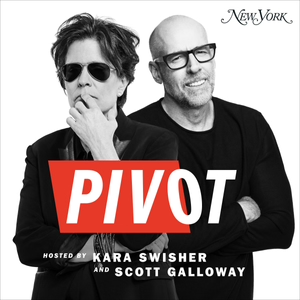
The World After Capital (with Albert Wenger)
04/25/23 • 58 min
Union Square Ventures partner Albert Wenger has been successful enough to write a techno-manifesto.
Wenger made early investments in companies like Twilio, MongoDB, and Etsy.
Now, he’s spending much of his time on USV’s climate investing out of the firm’s $200 million climate fund.
Wenger has historically been a media recluse — but he’s started popping his head out.
So when I got the opportunity to talk to him on the Newcomer podcast, I jumped.
After all, Union Square Ventures has ranked 1st and then 2nd in the Founder’s Choice VC Rankings. And USV was among the first venture capital firms to privately raise the alarm to portfolio companies that they needed to protect against a banking crisis. So we had a lot to talk about.
Plus, Wenger is in the big ideas phase of his career.
“We live in a period where there is an extraordinary range of possible outcomes for humanity. They include the annihilation of humankind in a climate catastrophe, at one extreme, and the indefinite exploration of the universe, at the other,” he concludes in his book The World After Capital, which is available for free online.
Wenger has a strong point of view about where we’re headed: He argues that we’ve moved from the Industrial Age to the Knowledge Age and that we need to dramatically rethink society in light of that change.
Despite the book’s manifesto-like qualities, The World After Capital frames up some of the core issues of our time. In particular, he argues that financial markets cannot adequately price the ultimate scarce resource of our age — attention.
As artificial intelligence looks poised to further disrupt society, Wenger’s point of view is only becoming more compelling.
In our Newcomer podcast discussion, Wenger and I examine the current state of universal basic income. You can hear how we think differently about the issue. I’m eager to think about how it could realistically be implemented in the United States sometime soon; he’s interested in the broad sweep of history.
On the podcast, we talk about the banking system and I interrogate whether there’s any hypocrisy in opposing the 2008 bank bailouts and defending the government’s decision to backstop depositors at Silicon Valley Bank.
It was a fun conversation that looks beyond the day-to-day news cycle to some of the bigger questions that technological progress posses for our society.
Find the Podcast
Get full access to Newcomer at www.newcomer.co/subscribe
Union Square Ventures partner Albert Wenger has been successful enough to write a techno-manifesto.
Wenger made early investments in companies like Twilio, MongoDB, and Etsy.
Now, he’s spending much of his time on USV’s climate investing out of the firm’s $200 million climate fund.
Wenger has historically been a media recluse — but he’s started popping his head out.
So when I got the opportunity to talk to him on the Newcomer podcast, I jumped.
After all, Union Square Ventures has ranked 1st and then 2nd in the Founder’s Choice VC Rankings. And USV was among the first venture capital firms to privately raise the alarm to portfolio companies that they needed to protect against a banking crisis. So we had a lot to talk about.
Plus, Wenger is in the big ideas phase of his career.
“We live in a period where there is an extraordinary range of possible outcomes for humanity. They include the annihilation of humankind in a climate catastrophe, at one extreme, and the indefinite exploration of the universe, at the other,” he concludes in his book The World After Capital, which is available for free online.
Wenger has a strong point of view about where we’re headed: He argues that we’ve moved from the Industrial Age to the Knowledge Age and that we need to dramatically rethink society in light of that change.
Despite the book’s manifesto-like qualities, The World After Capital frames up some of the core issues of our time. In particular, he argues that financial markets cannot adequately price the ultimate scarce resource of our age — attention.
As artificial intelligence looks poised to further disrupt society, Wenger’s point of view is only becoming more compelling.
In our Newcomer podcast discussion, Wenger and I examine the current state of universal basic income. You can hear how we think differently about the issue. I’m eager to think about how it could realistically be implemented in the United States sometime soon; he’s interested in the broad sweep of history.
On the podcast, we talk about the banking system and I interrogate whether there’s any hypocrisy in opposing the 2008 bank bailouts and defending the government’s decision to backstop depositors at Silicon Valley Bank.
It was a fun conversation that looks beyond the day-to-day news cycle to some of the bigger questions that technological progress posses for our society.
Find the Podcast
Get full access to Newcomer at www.newcomer.co/subscribe
Previous Episode

Amazon Bedrock & BabyAGI (with Jon Turow)
Before becoming a partner at Madrona Venture Group, Jon Turow worked as the head of product for computer vision at Amazon Web Services. He spent nine years at AWS in the product organization. Since becoming a venture capitalist, he’s invested in promising AI companies like Runway and Numbers Station, along with the buzzy data company MotherDuck.
So when Amazon announced a partnership, called Amazon Bedrock, with Anthropic, Stability AI, and AI21 Labs, I asked Turow to come on the show to help me break down Amazon’s effort to bring foundation models closer to its cloud customers.
Turow is someone who has helped me think through everything that’s happening in artificial intelligence broadly. So we had a fun conversation about open source and the excitement around AI agents — like BabyAGI.
This episode of Newcomer is brought to you by Vanta
Security is no longer a cost center — it’s a strategic growth engine that sets your business apart. That means it’s more important than ever to prove you handle customer data with the utmost integrity.
But demonstrating your security and compliance can be time-consuming, tedious, and expensive. Until you use Vanta.
Vanta’s enterprise-ready Trust Management Platform empowers you to:
Centralize and scale your security program
Automate compliance for the most sought-after frameworks, including SOC 2, ISO 27001, and GDPR
Earn and maintain the trust of customers and vendors alike
With Vanta, you can save up to 400 hours and 85% of costs. Win more deals and enable growth quickly, easily, and without breaking the bank.
For a limited time, Newcomer listeners get $1,000 off Vanta. Go to vanta.com/newcomer to get started.
Find the Podcast
Get full access to Newcomer at www.newcomer.co/subscribe
Next Episode

Traffic Jam (with Ben Smith)
The blitzscaling funding model failed news companies.
Vice Media — which raised more than $1 billion from the likes of TPG, Technology Crossover Ventures, and Disney — is reportedly preparing to file for bankruptcy.
BuzzFeed — which raised hundreds of millions of dollars from investors like Andreessen Horowitz, General Atlantic, and NBCUniversal — just shut down its news division and has watched its stock price sink 95% since going public via a SPAC.
Meanwhile, Gawker, which successfully avoided the cash-burning approach, was brought down in a lawsuit funded by tech billionaire Peter Thiel.
This episode of Newcomer is brought to you by Vanta
Security is no longer a cost center — it’s a strategic growth engine that sets your business apart. That means it’s more important than ever to prove you handle customer data with the utmost integrity.
But demonstrating your security and compliance can be time-consuming, tedious, and expensive. Until you use Vanta.
Vanta’s enterprise-ready Trust Management Platform empowers you to:
Centralize and scale your security program
Automate compliance for the most sought-after frameworks, including SOC 2, ISO 27001, and GDPR
Earn and maintain the trust of customers and vendors alike
With Vanta, you can save up to 400 hours and 85% of costs. Win more deals and enable growth quickly, easily, and without breaking the bank.
For a limited time, Newcomer listeners get $1,000 off Vanta. Go to vanta.com/newcomer to get started.
In his new book, Traffic: Genius, Rivalry, and Delusion in the Billion-Dollar Race to Go Viral, former BuzzFeed editor-in-chief Ben Smith takes stock of the heady days of media spending and snarky online writing. (Of course, for all his insistence that that spendy era of media is over, Smith is the co-founder of Semafor, a company that raised $25 million — including about $10 million from Sam Bankman-Fried — to build a new digital media business.)
I invited Smith on the podcast to talk about his new book.
I started the discussion by going back to David Carr’s 2012 profile of BuzzFeed.
Carr wrote at the time:
[W]ith the addition of Mr. Smith and his new hires, BuzzFeed is growing some serious news muscles under a silly, frilly skin, and added the header “2012” for election coverage. (More traditional news verticals will be rolled out in the coming months.) It’s gone well so far, with comScore showing 10.8 million unique visitors in December, more than double that of the same month in 2010.
Its business model, in part, capitalizes on the mix of high and low content; instead of banner ads, BuzzFeed works with companies like Pillsbury to create content ideal for sharing, including “10 Things You Never Knew You Could Do With a Crescent Roll.”
If it is successful, BuzzFeed will generate the kind of traffic that will rival behemoths like, yes, The Huffington Post. Mr. Peretti says that BuzzFeed makes a profit some months, but given the level of investment and growth — there are now 78 people in its Flatiron offices — the burn rate on that new chunk of capital is significant. “It’s fun to watch them make all these hires,” said Choire Sicha, the founder of The Awl site and a veteran of the New York Web scene. “But it’s important that they don’t overspend. Web ad rates are what they are and that isn’t going to change.”
Then I turned the conversation to former Gawker editor Max Read’s review of Traffic.
In the end, only one character in “Traffic” can really be said to have any vision. In 2013, Disney CEO Bob Iger offered to buy BuzzFeed for $650 million. In the book’s strangest and funniest scene, a nightmare blunt rotation of Smith, Peretti, BuzzFeed video chief Ze Frank and BuzzFeed president Jon Steinberg get high on a hotel balcony in...
If you like this episode you’ll love
Episode Comments
Generate a badge
Get a badge for your website that links back to this episode
<a href="https://goodpods.com/podcasts/newcomer-podcast-218841/the-world-after-capital-with-albert-wenger-29844549"> <img src="https://storage.googleapis.com/goodpods-images-bucket/badges/generic-badge-1.svg" alt="listen to the world after capital (with albert wenger) on goodpods" style="width: 225px" /> </a>
Copy




